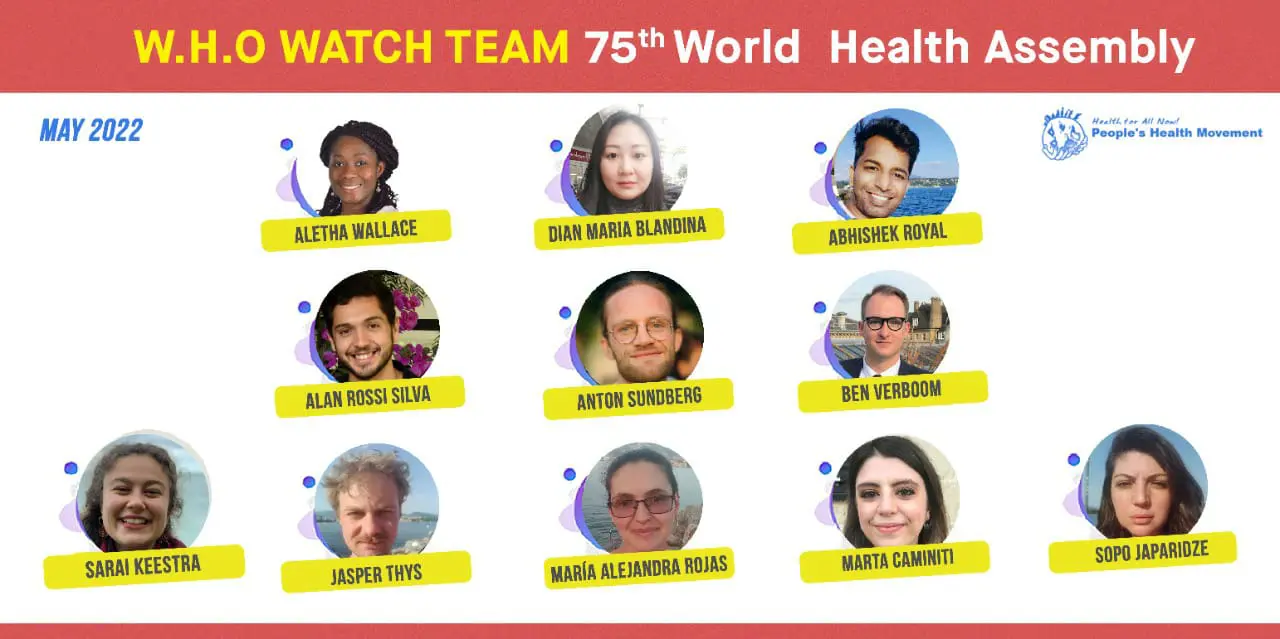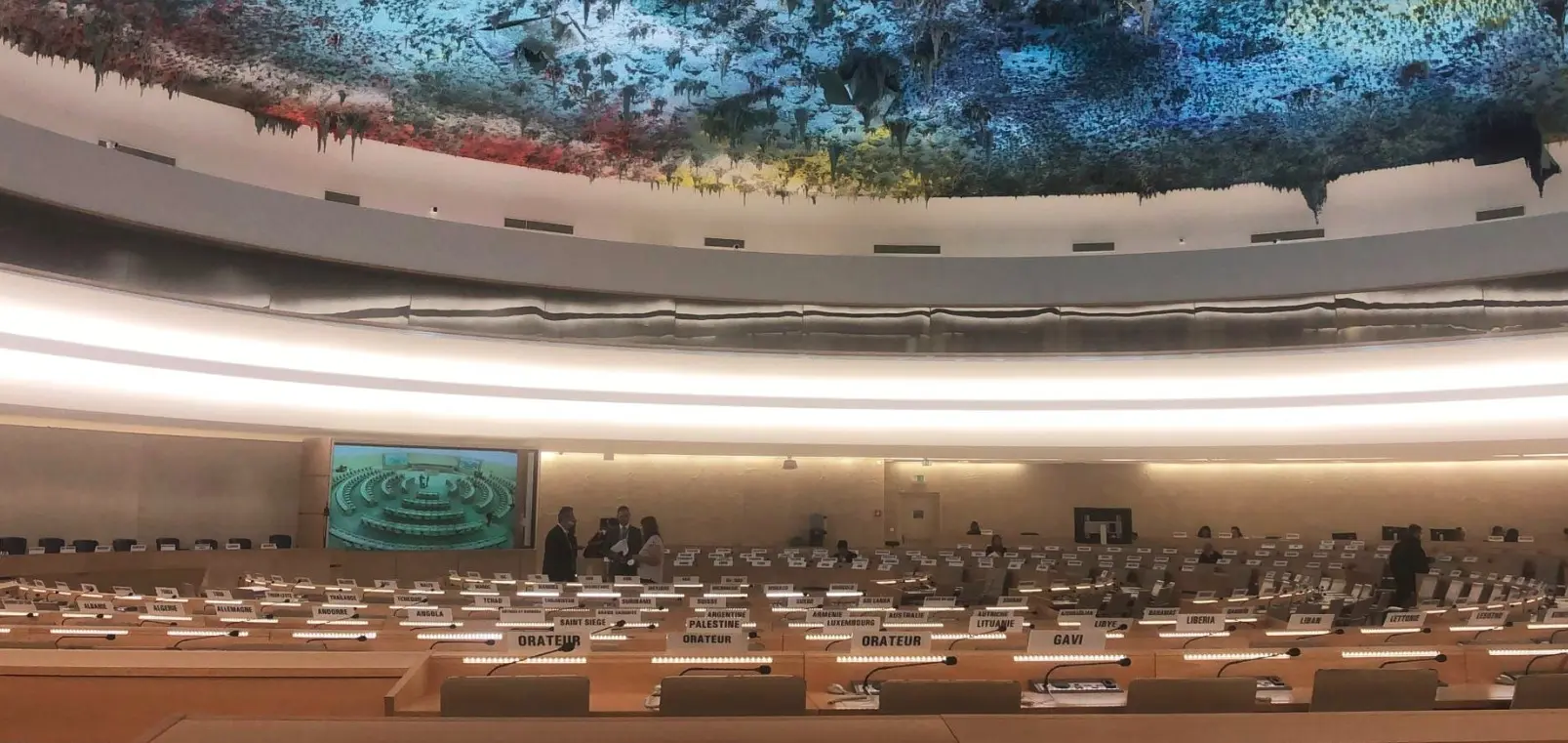Private monopolies hinder progress on public health: intellectual property at the 75th World Health Assembly
Obstruction by pharmaceutical companies from the Global North and misuse of monopoly privileges continue to slow down research into new vaccines and medicines, with disastrous effects for people’s health in the Global South. Discussions at the 75th World Health Assembly did little to address this.
While delegations at the 75th World Health Assembly (WHA) in Geneva related their experiences of not having enough COVID-19 vaccines for even their health care staff and essential workers, less than 300 kilometers away in Davos, the billionaire CEO of Moderna said he does not think sharing the vaccine recipe with the World Health Organization (WHO) hub for technology transfer to developing countries “is a priority right now”.
Meanwhile at the World Trade Organization (WTO), a few developed countries with strong ties to the pharmaceutical industry continued to lobby hard to jeopardize the negotiations on temporarily waiving certain Intellectual Property (IP) privileges, such as patents, industrial designs, copyright and protection of undisclosed information during the COVID-19 pandemic through what is known as the TRIPS waiver.
Although the speedy innovation of COVID-19 vaccines can be celebrated as a great scientific achievement, the ongoing inequality in access reveals the great moral failure of the current biomedical innovation system that is profit driven, instead of health driven. Companies are making a killing out of a global pandemic, whilst people get killed by a lack of access to life saving vaccines, diagnostics, and therapeutics.
No innovation
The IP system is not delivering on its promise of fostering innovation. In fact, IP was never meant to incentivize the human ability to invent new technologies and improve our quality of life. Instead, it is an exercise of power and money, which allows private actors to crowd out competitors and set prices as high as the market can bear: a biomedical innovation system whose aim is to generate the most private profits rather than improving people’s health. This creates a system where diseases affecting people living in wealthy countries who can pay up are prioritized, while those predominant in poor and marginalized communities are neglected.
An overwhelming majority (98%) of tuberculosis cases occur in low-and-middle income countries (LMICs) as the disease is consistently associated with poor housing, undernutrition, displacement, and poverty. More than 20 million people have died of tuberculosis since the year 2000, yet only one vaccine has been developed for the disease ever since its discovery in 1882. Funding for research and development (R&D) on tuberculosis currently meets less than 50% of WHO targets, and the End TB Targets for 2022 will not be met.
On the other hand, governments spent over US$ 100 billion on COVID-19 vaccines and treatments R&D in the first year of the pandemic alone – 162 times more than they spent on TB research – yielding impressive results. Multiple vaccines became available within less than a year from the declaration of the Public Health Emergency by the WHO.
While discussing the Global Strategy for Tuberculosis Research and Innovation, the Assembly failed to acknowledge the role of IP monopolies in skewing research money towards diseases more profitable than tuberculosis or Neglected Tropical Diseases (NTD). Yet, most countries mentioned that the COVID-19 pandemic slowed down progress against TB and NTDs, and asked for extra financial resources to support diagnosis and treatment. The Thai delegation also mentioned that the same kind of rapid investment in R&D we have witnessed during COVID-19 is necessary when it comes to TB. This raises an interesting question, how can we learn from the COVID-19 pandemic to support rapid R&D investment in other priority areas of health? And can we reprioritize our research targets without talking about the underlying issue of IP?
An obstacle to production and distribution
Instead of being designed to foster innovation, the IP system revolves around money and power. The project of protecting market monopolies, which was enshrined in the international Agreement on Trade-Related Aspects of Intellectual Property Rights (TRIPS) at the WTO in the 1990s, has been aggressively expanded and defended by its creators. It creates an artificial scarcity of health technologies, which could be resolved by equitable technology transfer and enhancing local manufacturing capacity. During the COVID-19 pandemic we have seen this artificial scarcity and lack of knowledge-sharing in action. When the whole world needed timely access to vaccines, IP monopolies undermined the ability to produce COVID-19 vaccines to save lives.
The current model led to the prioritization of vaccine delivery to rich countries who could pay-up through bilateral deals over equitable vaccine sharing, and has directly caused the preventable death of millions of people. In this context, the President of the Dominican Republic called on the Assembly to build governance mechanisms on solidarity. Specifically, he said that although it is understandable that governments prioritized their own populations during the COVID-19 pandemic, the Assembly had to find a way to include solidarity in its policies. During his opening address to the Assembly, António Guterres, Secretary General of the United Nations (UN), also spoke out against vaccine hoarding.
How many lives could have been saved if knowledge had been shared equitably from the start, and manufacturing potential unleashed to its full potential?
Prices are too high
Next to the artificial impediments caused by IP for the sharing of biomedical knowledge and technical knowhow, the current biomedical innovation system also allows the creation of price monopolies guaranteeing stratospheric profits. Take for example sofosbuvir, an extremely important drug used in the treatment of hepatitis C, which the World Health Assembly discussed while looking at global health sector strategies on, respectively, HIV, viral hepatitis and sexually transmitted infections. When sofosbuvir was first put on the market, the price of a 12-week course in the United States was US$ 84,000, although it only costs US$ 101 per treatment course to produce.
Due to price monopolies, US patients were charged US$ 1,000 for every single pill, making sofosbuvir 67 times more expensive than gold. Although the R&D of this drug has received a significant amount of public resources, the IP system enabled the originator company to treat this life-saving drug as a luxury good. Due to more recent generic competition by manufacturers in some low- and middle income countries, the price in India is currently as low as $15 for a 28-day supply.
In the WHA, Malaysia specifically mentioned the importance of the new drug ravidasvir, the first hepatitis C treatment developed through South-South cooperation with support from nonprofit organizations. In combination with sofosbuvir, ravidasvir can cure up to 97% of patients. But in contrast to sofosbuvir’s prohibitive price, the new combination is being sold at the price of USD 300-500 for a three-month treatment course. This is a huge step forward towards a hepatitis free world and affordable pricing of hepatitis C medicines.
What is the purpose of creating new medicines if the sick cannot afford it? Are we ready to challenge a system that prices medicines out of patients’ reach because we continue engaging with an IP system that puts profits over people?
Several topics from the World Health Assembly’s agenda have pointed to the fact that structural violence from the IP system plays a major role in undermining progress in global public health, be it in the issue of COVID-19, tuberculosis, viral hepatitis, or other diseases. However, this silent agenda was not explicitly spoken of. Considering the suffering, lost lives and livelihoods due to the lack of affordable medicines, the question we need to ask at this point is clear: with a greater sense of urgency and humanity, can we reinvision our biomedical innovation system on the basis of solidarity?
A first step towards change would be for countries to support a full TRIPS waiver at the WTO Ministerial Conference taking place in Geneva from 12-16 June. However, more multilateral action across UN institutions is needed to address the systemic inequities in our biomedical innovation system.

The WHO Watch team members are Abhishek Royal, Alan Rossi Silva, Aletha Wallace, Anton Sundberg, Ben Verboom, Dian Maria Blandina, Jasper Thys, Maria Alejandra Rojas, Marta Caminiti, Sarai Keestra, Sopo Japaridze, Lauren Paremoer, Jyotsna Singh, and Gargeya Telakapalli.
This article was published earlier on People’s Dispatch.


